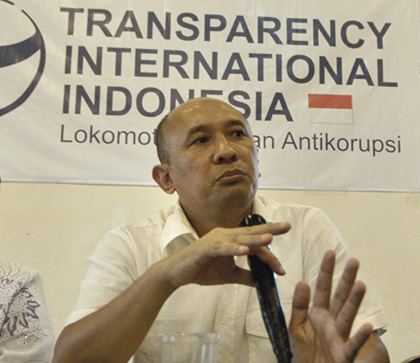.................................................................................
Chapter 10: Gritty Graftbuster
For over six decades, the potential and image of resource-rich Indonesia have been blighted by corruption. While corruption is considered a norm by much of Indonesian society, some citizens, like Teten Masduki, have chosen to fight back against it.
A high school teacher, Teten1 became a labor rights activist after witnessing gross injustices to workers. In 1998, just after President Suharto stepped down, Teten founded the Indonesian Corruption Watch (ICW). Under his leadership, ICW became a clearing house for whistle-blowing on corruption, cronyism, and nepotism, making its mark with several high-profile corruption cases.
In 2009, Teten joined Transparency International (TI) as secretary-general of its Indonesian chapter, where he went beyond individual casework to focus on the larger picture of the processes, regulations, and education needed to fight corruption.
In 2012, inspired by the rise of good, clean leaders such as Joko Widodo, Teten made the decision to enter politics. Today, he is the presidential chief of staff in the Indonesian government, taking his fight against corruption to a whole new level.



Brief facts
TETEN MASDUKI
|
1963 |
Born in Garut, West Java, Indonesia to Javanese parents |
|
1978 |
Staff researcher, Center for Information and Human Right Study (INSAN), until 1989 |
|
1982 |
Student, Institute of Education and Teacher Training, Bandung; became President of the Students Union |
|
1987 |
Teacher, Family’s Wealth Middle School, Tangerang, until 1990 |
|
1989 |
Head, Research and Development, Independent Solidarity Labor Union, until 1990 |
|
1990 |
Head, Labor Division, Indonesian Legal Aid Foundation (YLBHI), until 2000 |
|
1991 |
Coordinator, Labor Solidarity Forum, until 1993 |
|
1995 |
Married Suzana Ramadhani, a labor rights worker |
|
1996 |
Coordinator, Labor Law Reform Consortium, until 1998 |
|
1998 |
Founded Indonesia Corruption Watch (ICW), was coordinator until 2008 |
|
2000 |
Member, National Ombudsman |
|
2009 |
Secretary-General, Transparency International Indonesia (TII), until 2012 |
|
2012 |
Ran for vice-governor position in the West Java elections |
|
2013 |
Joined National Home (Rumah Kebangsaan) |
|
2015 |
Appointed Special Staff to Cabinet Secretary Andi Widjajanto in charge of governance reforms and subsequently Presidential Chief of Staff by President Jokowi |
AWARDS & RECOGNITION
|
1999 |
Suardi Tasrif Award |
|
2000 |
London Training College Alumni Achievement |
|
2004 |
BusinessWeek’s Opinion Shaper, Asian Stars |
|
2005 |
Ramon Magsaysay Award |
For over six decades, the potential and image of resource-rich Indonesia have been blighted by corruption. While corruption is considered a norm by much of Indonesian society, some citizens, like Teten Masduki, have chosen to fight back against it.
A high school teacher, Teten1 became a labor rights activist after witnessing gross injustices to workers. In 1998, just after President Suharto stepped down, Teten founded the Indonesian Corruption Watch (ICW). Under his leadership, ICW became a clearing house for whistle-blowing on corruption, cronyism, and nepotism, making its mark with several high-profile corruption cases.
In 2009, Teten joined Transparency International (TI) as secretary-general of its Indonesian chapter, where he went beyond individual casework to focus on the larger picture of the processes, regulations, and education needed to fight corruption.
In 2012, inspired by the rise of good, clean leaders such as Joko Widodo, Teten made the decision to enter politics. Today, he is the presidential chief of staff in the Indonesian government, taking his fight against corruption to a whole new level.
End Notes
- In deference to the convention in Indonesia, we have used the name they are often referred to formally and in the media. This often is the first (and sometimes only) name. Until recently, most Indonesians did not have family names and their “surname” was just another personal name. Thus Teten Masduki is often referred to as “Teten” (his first name) rather than “Masduki” (his family name). “Masduki is my father,” said Teten when he explained this Indonesian custom to the authors

